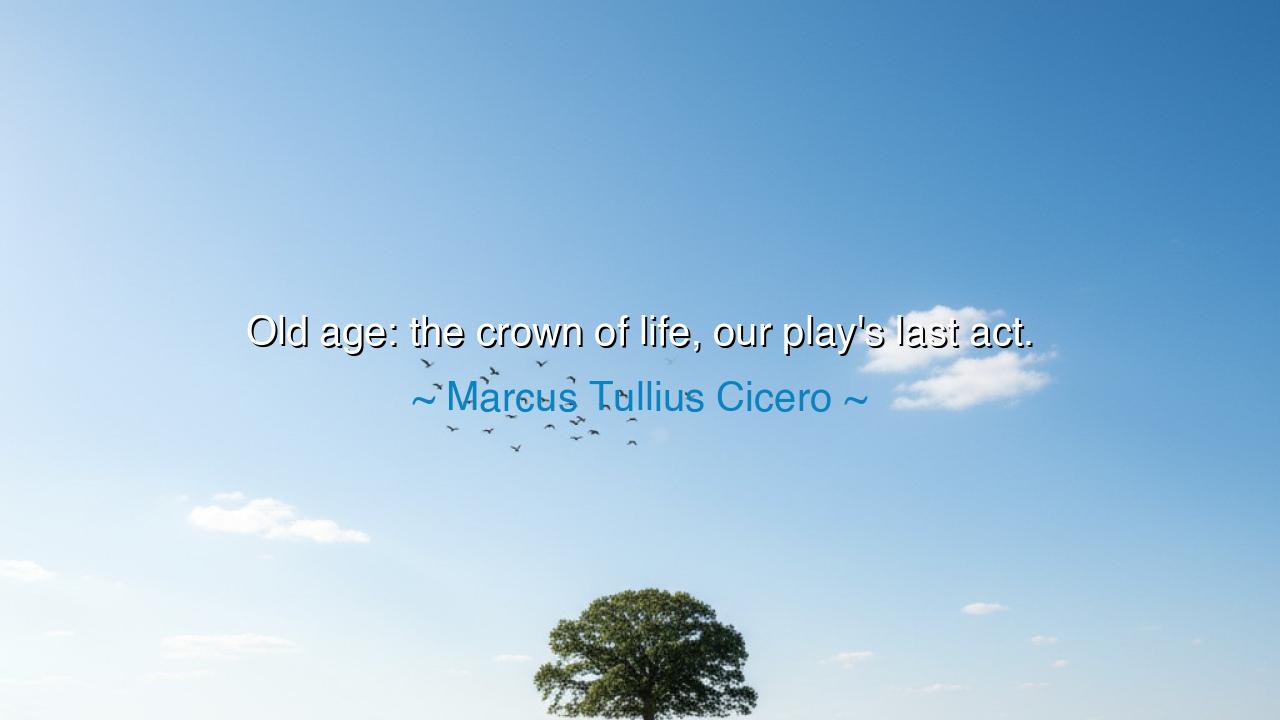
Old age: the crown of life, our play's last act.






In the twilight of the human journey, when the sun begins to set upon the life that was once so full of vigor, there comes a profound moment of reflection. It is here, in this sacred moment, that Cicero, the great philosopher and statesman of Rome, offered his timeless wisdom: “Old age: the crown of life, our play’s last act.” These words, like the closing notes of a symphony, carry with them a deep resonance that calls us to look upon age not with sorrow or fear, but with reverence and understanding. For in the quiet of old age, there lies not only the end of life’s journey but also the culmination of all that came before—a rich harvest of experiences, of triumphs and failures, of joys and losses.
To consider old age as the crown of life is to recognize that it is not a time of decline, but a time of great wisdom and peace. Just as a crown adorns a ruler’s head, so too does old age adorn the soul, giving it the dignity and honor of having lived fully. It is the crown that signifies the culmination of a life well-lived, of lessons learned, and of the deep, hard-earned truths that can only be gained through the passing years. It is not in the strength of youth, nor in the ambition of middle age, but in the wisdom of old age that a person truly comes to understand the deeper meanings of life.
The ancients understood this truth well. Socrates, though famously criticized for his age and eccentricities, knew the profound power that lay in the later years of life. As he approached the end of his days, he did not lament his impending death, but instead celebrated the clarity and understanding that had come with the passage of time. For him, old age was a time of reflection, of seeking the truths that could only be revealed through a lifetime of searching. It was not an end, but a final act in the play of life, an act in which the most profound lessons were imparted.
Consider also the life of the great Plato, who in his later years turned inward, reflecting upon the philosophies he had so passionately shared in his youth. In his dialogues, Plato spoke of the soul’s journey, its continual search for wisdom, and the importance of living a virtuous life. He did not shy away from old age but welcomed it, for he knew that it was in the quiet of one’s later years that the soul could finally come to rest, having understood the deeper mysteries of existence. For Plato, and for many of the great minds of antiquity, old age was not a curse, but a blessing, a time to look back with clarity and look forward with peace.
And so it is with each of us. In our youth, we are driven by ambition, by the thirst to achieve, to conquer the world and all that lies within it. In our middle years, we strive to find meaning and purpose, often toiling against the demands of society and circumstance. But as the years grow long, and the fires of ambition begin to wane, there comes a time when we can finally sit back and reflect on the journey. Old age is not simply the last act of a play; it is the moment when the actor has come to understand the meaning of the role they have played. It is the time when one can look back with gratitude, knowing that all the struggles and triumphs were part of a larger story that has now come to completion.
We can look to the life of Winston Churchill, whose years of leadership and struggle in the world of politics culminated in a time of reflection. In his later years, Churchill turned to writing, to memoirs that spoke of the great historical events he had witnessed, and of the wisdom that came from his long life of service. He did not see his old age as a time of decline, but as a time of reflection, of passing on the lessons he had learned, and of finding peace in the knowledge of a life well-lived.
And so, Cicero’s words carry with them a lesson that we must all heed: to embrace old age not with fear or regret, but with honor. It is the crown of life, the final act in the grand play that each of us performs. In that final act, there is the opportunity to pass on wisdom to the next generation, to rest in the peace of having lived a life of meaning, and to face the end with grace. Let us not dread the approach of old age, but rather, let us look upon it with reverence, knowing that it is the moment when the full story of our lives is revealed in its deepest, most profound sense.
In our own lives, we must strive to live each day with the knowledge that every moment counts. The crown of life is not earned by seeking glory or wealth, but by living with purpose, by making choices that reflect our deepest values, and by learning from the mistakes and victories of each passing day. Let us move toward our later years with gratitude and wisdom, knowing that they are the culmination of all that has come before. And may we, like the great minds of old, embrace old age not as an end, but as the crowning of a life well-lived, a time when the final act of our story is played with dignity, peace, and understanding.






AAdministratorAdministrator
Welcome, honored guests. Please leave a comment, we will respond soon